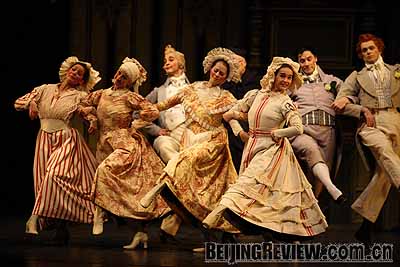| Apart from traditional ways of celebrating the Spring Festival, Chinese people now go to theaters to relax during the most important holiday of the year. In the past, people generally stayed at home with family members or visited relatives and friends during this time.

To take advantage of this new trend, theater operators planned well ahead for an influx of patrons and saw impressive box office hauls, despite impacts of the world economic crisis. During the weeklong holiday from January 26 to 31, around 30 performances were staged throughout Beijing.
The National Center for the Performing Arts in Beijing, one of the country's best cultural facilities that opened in early 2008, prepared a feast of shows. A total of 11 performances were staged in the holiday, with the attendance levels at each being close to capacity. For some performances, tickets sold out soon after they became available, leaving many people disappointed.
"We had made special planning for the golden season of Spring Festival," said Deng Yijiang, spokesman of the center, in an interview with the Beijing Evening News. "We still adhere to our principle of presenting first-class performances and try to cover as many genres of art as we can at the same time, which includes concerts, ballet, Peking Opera and other folk operas of China."
Besides Chinese artists, foreign performing troupes also joined the Spring Festival performance season, bringing variety that delighted audiences. On January 28-31, the Israel Ballet presented the timeless classic Cinderella and a performance that consisted of segments of three other classic ballets with different styles.
In the last three days of the holiday, the National Center for the Performing Arts also arranged several concerts, which presented theme melodies from classic movies, taking the audience on a nostalgic trip down memory lane.
According to official statistics, the number of people who visited the National Center for the Performing Arts totaled 35,000 during the Spring Festival holiday.
Huo Wenli, a teacher at the Communication University of China, spent a full day in the National Center for the Performing Arts with her parents. They watched Hong Deng Ji, or Story of the Red Lantern, a household Peking Opera show, as well as visiting some art exhibitions held in the center.
"This year is the first time my parents spent the Spring Festival in Beijing, and they loved watching performances here with me in the best theater in China," she said, adding that the experience gave her a new perspective on how it was possible to celebrate the traditional festival in innovative ways.
At the same time, many people flocked to movies. More than 10 new movies premiered in China around the Spring Festival holiday, including love stories, comedies, animated tales and Hollywood blockbusters. According to an article in the Beijing Daily, the box office earnings in Beijing alone increased by 30 percent over the same period last year. Some cinemas also offered night shows, with 80 percent of tickets sold.
"Many films are family-friendly," said Pei Donghui, mother of a 7-year-old girl in Beijing. "I have already taken my daughter to watch the domestic animated movie Pleasant Goat and Big Big Wolf and the American fairytale Bridge to Terabithia. She loved them both."
According to the Beijing Youth Daily, the box office income of the movie Pleasant Goat and Big Big Wolf topped 30 million yuan ($4.3 million) in its first week of screening, an all-time high for Chinese full-length feature animated movies.
Movie theaters also drew crowds of young people. Love stories were the major attraction, such as If You Are the One by Chinese Director Feng Xiaogang and Australian epic Australia starring Oscar-winner Nicole Kidman and hunky actor Hugh Jackman.
"Watching a movie with family members or friends during the Spring Festival is one of the new ways of relaxation, and it made the days during the traditional festival more colorful. I enjoyed it very much, " Pei said. | 